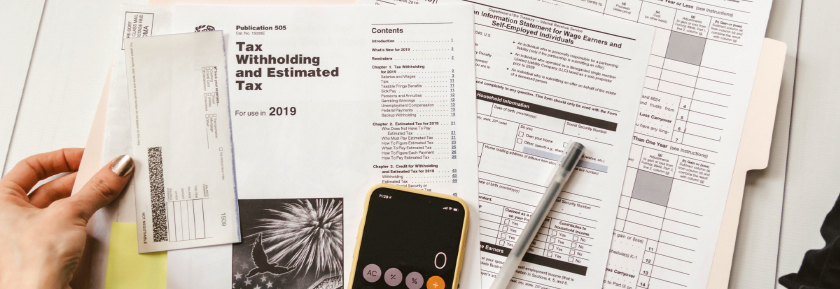As we head into the height of tax season, we’re beginning to field more and more questions from our customers and the general public about crypto taxes. After all, the IRS has been relatively slow to offer clarity on lingering questions on the topic (although there are recent signs that that may be changing), so it’s only natural for there to be a lot of uncertainty out there.
At BitIRA, we are not tax experts, but we’re fortunate enough to know plenty of people who are. So, just like last year, we’ve reached out to experts in crypto taxation and posed to them some of the questions that you’ve asked us. All questions are posted anonymously, and we hope that they are of assistance as you prepare your 2019 tax return. Because contribution limits and tax rules may change, be sure to check with the IRS for the latest guidelines. You can view 2024 contribution limits here.
To learn more about these crypto tax professionals, you can read their bios at the bottom of this article.
Article Content
Ask a Tax Question
Got a crypto tax question you’d like to have one of our partner tax experts answer in a future post? Submit in the form below.
Deductions
“What about all of the fees that Coinbase has charged me over the years? Are they considered a write off?”
Fees incurred from cryptocurrency exchanges affect the cost basis of your crypto holdings. In this sense, they are already factored into your gains and losses from trading.
–David Kemmerer, CryptoTrader.Tax
Inactivity

Image by 401kcalculator.org/ Photoshopped / CC BY 2.0
“I didn’t sell any of my coins in 2019, do I still have to pay taxes?”
You still may need to report certain cryptocurrency transactions on your taxes even if you haven’t “sold”. All taxable events need to be reported on Form 8949. If you traded one cryptocurrency for another, for example, this triggers a taxable event, and you realize a gain or loss. Additionally if you have mined or otherwise earned cryptocurrency in any form, you will need to report this as income on your taxes. However, if all you have done is held onto existing coins during the year, this would not need to be reported on 8949 as you haven’t incurred any taxable events.
–David Kemmerer, CryptoTrader.Tax
If you had mining, staking, or airdrop income in 2019 then yes you would still need to pay taxes on those events. Also if you spent crypto (for coffee, or any other good or service) that is also a taxable event that would have to be reported. But if you had no sales or spends of crypto, and no mining, staking, or other crypto related income then yes you would likely not owe taxes on anything related to crypto for 2019.
–Zac McClure, TokenTax
“I haven’t traded. I’ve given to family or purchased crypto. I haven’t made any money yet. What form do I file for that? If I sold any crypto at this point it would just be at a loss.”
If you never sold your cryptocurrency or traded it for another cryptocurrency then you haven’t realized a capital gain or loss. You would therefore not be required to file an IRS 8949 capital gain/loss tax form. However, you will still need to attest on your tax forms whether “[a]t any time during 2019, did you receive, sell, send, exchange, or otherwise acquire any financial interest in any virtual currency.” Because you acquired a financial interest you must respond “yes” to this question even though you are not required to file a tax form for your acquired cryptocurrency.
–Justin Woodward, TaxBit
“I’ve been reading a lot lately about Litecoin, crypto, taxes, and etc. I always thought if you held your coins on a personal wallet and *hodled* them, and did not make any transactions whatsoever then you did not have to report them or pay tax on it until you sold them. Is this still true?”
That is correct. If you do not spend, sell, or trade your Litecoin, then you would not have any realized gains or losses to report; however, starting in 2019 you may still need to answer “Yes” to the Schedule 1 question asking if you used cryptocurrencies in 2019.
–Laura Walter, Crypto Tax Girl
Digital IRAs
“How does crypto bought in an IRA count towards annual contribution limits?”
The IRS has not provided any guidance regarding treatment of crypto assets within an IRA account. However, we do know that the Service has determined that crypto assets are property, and thus, the treatment of crypto assets within an IRA should be treated as any other property. We can analogize with the treatment of stock within an IRA account. With the exception of rollover contributions, all contributions to an IRA must be made in cash, and since crypto is treated as property the contribution of crypto to an IRA will not be deductible. The annual contribution limits for 2020 is $6,000 ($7,000 if over age of 50).
–Ani Galyan, Galyan Law
Taxable Events
“I have taken no profits, my investments have sat in Coinbase. I moved $1,500 from Coinbase to another exchange to buy altcoins but my investment in altcoins has dropped in value. Do I need to file on the transfer of funds from one exchange to another?”
You don’t need to report the transfer of coins from Coinbase to another exchange; however, if you used crypto to purchase the altcoins, then you will need to calculate the gain or loss on it and report it on your return. If you bought the altcoins with USD, then you don’t need to report anything until you trade, spend, or sell.
–Laura Walter, Crypto Tax Girl
“If I bought crypto and am still holding it, do I need to report anything to the IRS? (When do I need to tell the IRS about my crypto?)”
If you bought and transacted with crypto during the year, you will have to check “yes” to the question on Form 1040 Schedule 1 which asks if you had any financial interest in any virtual currency. You may also have incurred taxable events that need to be reported as income on your tax return.
–David Kemmerer, CryptoTrader.Tax
“If I use, for example, some BNT and ETH to get a relay token (ETHBNT), is that a taxable event? I’m thinking it isn’t since you’re technically just joining two existing cryptos together to serve a new purpose (provide liquidity).”
Here, the trader is taking two identifiable properties and combining it into a balancing connector. The relay does not create a new type of an asset/coin but acts like a contract. When purchasing or selling a coin within a relay, the trader has a taxable event and must report the event. It is important to first establish the basis of the coins used in the transaction to properly report. Traders should keep contemporaneous records of their activities and consult with their tax advisers for reporting purposes. The Service has issued guidance in the form of Frequently Asked Questions on Virtual Currency, available on IRS.gov, however has not addressed the issue of relay coins. It may be necessary to include a disclosure statement with the filers income tax return for an uncertain position taken.
–Ani Galyan, Galyan Law

Recording, Reporting, and Requirements
“If I transfer between exchanges, (presumably I’m buying the same USD in a new exchange as in the first) how do I calculate the capital gains on this transfer? (And, bonus question, can I deduct exchange fees?”
Transferring between exchanges or your own wallets is not a taxable event, so there are no gains or losses to calculate. Fees can be added to the cost basis and deducted from the proceeds though, when calculating gains and losses, per Revenue Ruling 2019-24.
–Laura Walter, Crypto Tax Girl
“If I bought crypto and then used it to pay for something, how do I report this on my taxes?”
Using crypto to purchase goods or services will result in a gain or loss, depending on whether the coin went up or down in value from the time you acquired it to when you spent it. For example, if you bought 1 BTC for $10,000, and then a few months later, BTC went up in value and you spent 0.1 BTC to pay for something that was $1,200, then you would have a gain of $200. In this case the proceeds would be $1,200, and the cost would be $1,000 (10,000 * 0.1 = $1,000).
–Laura Walter, Crypto Tax Girl
“At what dollar amount of gains must I report on my taxes?”
There is no de-minimis exclusion on cryptocurrency gains and losses. In the US, there is a $200 de minimus exclusion for gains and losses on currencies like Yen and Euros but this does not hold true for cryptocurrency. In the UK, there is a capital gain exemption and crypto gains only need to be reported in excess of about ~$15,000 USD. Wouldn’t it be great if the US had a similar exemption!
–Zac McClure, TokenTax
“What documents (for the crypto I own or have owned) do I need to have on hand as I prepare my 2019 taxes?”
Taxpayers who traded crypto must file an IRS 8949 capital gain/loss tax form. Taxpayers are required to report every sale or trade of cryptocurrency, its associated cost basis, holding period, proceeds, and acquisition date. The IRS also requires taxpayers to maintain transaction records to verify the accuracy of their forms. TaxBit automates the process of aggregating your data across exchanges, producing necessary tax forms, and maintaining an immutable audit trail as evidence of your gains and losses.
–Justin Woodward, TaxBit
Special Considerations
 “Does owning cryptocurrency make me more susceptible to an audit?”
“Does owning cryptocurrency make me more susceptible to an audit?”
Perhaps, it is very hard to see but I’d guess a more important factor is probably your income level, or whether you are self-employed. Likelihood of audit seems to rise with the amount of income you have earned in a given tax year, and self-employed people are audited at higher rates than employees who receive a W2 from their employer. The IRS publishes data about audits every year, perhaps they will tell us in the future the percentage of people audited had cryptocurrency transactions on their tax return, or whether an individual’s cryptocurrency activity (or lack thereof) had an impact on audit rates.
–Zac McClure, TokenTax
Tax Specialist Bios
We’d like to thank the five crypto tax professionals that helped answer your questions for the 2019 tax season. Below is information about the professional background of each specialist.

Ani Galyan, Galyan Law
Ani Galyan is an attorney and Certified Tax Specialist with the State Bar of California. In addition, Ani is a certified public accountant admitted to practice in California. She also holds a Masters in Tax Law (LL.M). Ani was recognized as Southern California Super Lawyers “Rising Star” in 2016 through 2019. Ani focuses her practice in the area of tax law for federal, state and local tax compliance, tax disputes, and tax crimes. Part of her practice focuses on advising clients on cryptocurrency IRS reporting obligations and navigating the complex reporting requirements for cryptocurrency investors. Ani obtained a B.S. degree in 2005 from USC in Accounting, a JD, Cum Laude, from Loyola Law School in 2012 and an LLM with Highest Distinction from Loyola Law School in 2012.

Zac McClure, TokenTax
Zac had an eclectic career before starting TokenTax. After a 2-year stint in Investment Banking he joined Teach For America where he taught math infused with personal finance and entrepreneurship – two passions that make up the foundation of TokenTax. The company currently works hard to teach clients about advanced tax topics such as accounting methods, tax-loss harvesting, retirement planning and portfolio diversification. Previously Zac also worked for social enterprises in Zimbabwe, Zambia, Madagascar, and India, as well as Social Impact investment firm Imprint Capital, Bain, and Elsevier. He earned an MBA from Wharton, and also holds degrees in International Finance and Accounting from USC.

Laura Walter, Crypto Tax Girl
Hi! My name is Laura, and I am a CPA who specializes solely in cryptocurrency tax issues. I am here to bring tax clarity to those who currently hold crypto, or to those who are looking to do so in the future. My goal is to make cryptocurrency taxation simple and easy to understand. I have helped over 1,200 people with their cryptocurrency tax needs, and I would love to help you too! I offer tax consultations, crypto gain & loss reports, tax returns, tax advisory services, and free crypto tax advice all year long on Twitter @cryptotaxgirl. Feel free to reach out any time!

David Kemmerer, CryptoTrader.Tax
David Kemmerer is the Co-Founder and CEO of CryptoTrader.Tax, a cryptocurrency tax software platform built to automate the entire crypto tax reporting process. Today, tens of thousands of crypto investors use CryptoTrader.Tax to automate their tax reporting.

Justin Woodward, TaxBit
Justin is a licensed tax attorney with a law degree from the University of Chicago, a top four law program in the US. Currently, Justin is the tax compliance and legal officer of TaxBit, a cryptocurrency tax software company that automates tax calculations and tax form generation for cryptocurrency users. Prior to TaxBit, Justin completed a federal judicial clerkship, which included consulting with Fortune 500 companies on how to accept Bitcoin as means of payment.
Note: The information presented in the article above is intended for educational purposes only. It is in no way meant to offer financial advice, and specific guidance about how to properly pay taxes in each individual case should be sought from a certified accounting professional.
Looking for CPA Crypto professionals that might be able to help with your taxes? Check out our growing directory of professionals.







